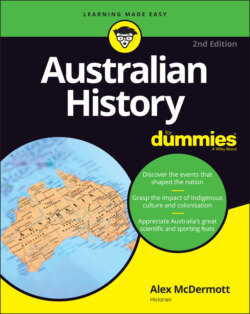Читать книгу Australian History For Dummies - Alex McDermott - Страница 77
Upsetting the reverends
ОглавлениеWord was beginning to get back to London: NSW was no place of punishment, and was out of control, said the alarmed reports. Many of the reports were written by furious Evangelicals — religious Anglican ministers (such as Reverend Johnson and Reverend Samuel Marsden) who had arrived in the colony expecting to be respected as pillars of the establishment order, only to find themselves largely ignored by the convicts, and by the common soldiers and the officer Corps as well.
Early NSW was anything but pious. Neither the convicts, nor the common soldiery, nor many of the officers, military or civil, set any real store on forswearing their preferred pursuits — swearing, gambling, drinking and fornicating. In this they were broadly reflective of the habits and pursuits of the bulk of Georgian England, but in NSW the established authorities and arbiters of proper morality held far less sway.
The Evangelicals were just launching their great moral revival at this time in late Georgian Britain; its chief exponent, William Wilberforce, experienced his ‘conversion’ at about the same time as the First Fleet was sailing. The Evangelists’ deep sense was that England had ‘fallen’ from the state of religious zeal of the previous century, and been seduced and corrupted by the luxuries and excesses that modern life offered. They wanted to ‘reclaim’ modern Britain from the various excesses and debaucheries that the 18th century had become famous for. The Evangelicals had some really positive social reform to their credit — most notably, the abolition of slavery in Britain — but they had their work cut out for them in the new colony of NSW.
Under the tutelage, direct and indirect, of Wilberforce, who was a friend of Prime Minister William Pitt and Sir Joseph Banks (a lot more about Banks in Chapter 3), clergymen of Evangelical bent were sent out to the new settlement.
Once in NSW, Reverend Johnson railed against the laxness of the Corps when it came to enforcing piety, and for allowing convicts to throw ‘aside all regard or reverence for the Sabbath Day, and to render all public solemn worship utterly contemptible’. Convicts were paid to work on Sundays. Other convicts were left to pretty much do whatever they wanted.
While Johnson was conducting services, he claimed the bulk of convicts ‘were either asleep in their hammocks or sitting in their huts, or otherwise gone out to work for officers or other individuals’. Just as bad, ‘spiritous liquor was the most general article and mode of payment for such extra labour, and hence in the evening the whole camp has been nothing else, often, but a scene of intoxication, riots, disturbances, etc’. Evangelical missionaries escaping from threatened violence in Tahiti in 1799, according to Johnson, found in the colony of NSW ‘Adultery, Fornication, Theft, Drunkenness, Extortion, Violence and Uncleanness of every kind’.
These expressions of horror and outrage were generally applied by Evangelicals to the various ‘unclaimed’ parts of England itself — whether it was the ‘debased’ aristocrats or the ‘lower orders’ then chiefly congregating in London. Yes, the people in NSW liked to whore, gamble, swear and drink, often to excess — but that didn’t mark them out as particularly different from a lot of people in the Georgian era.
